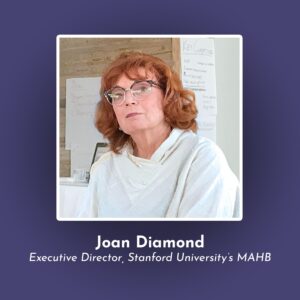
Ep 28 | Joan Diamond
Joan Diamond: “From Kool-aid to Lemonade”
On this episode we meet with Executive Director of Stanford University’s Millennium Alliance for Humanity and the Biosphere, Joan Diamond.
Diamond helps us imagine the future in an uncertain time. How can we create robust strategies to help us plan? How can we avoid thinking only of worst-case scenarios?
Further, Diamond offers suggestions for how people can handle their hopelessness and rage following recent Supreme Court rulings. What options exist for people to change systems?
About Joan Diamond
Joan Diamond has executive background in private and nonprofit sectors, including Fortune 500 energy enterprises including executive VP of Hawaiian Electric Company, vice president and corporate secretary of a Silicon Valley telecommunications company, and COO of the Nautilus Institute for Security and Sustainability. She is the Executive Director of Stanford University’s Millennium Alliance for Humanity and the Biosphere (MAHB) and of the Crans Foresight Analysis Nexus (FAN).
In French, we have a motto that says that a simple drawing is often better than a long explanation. Jean-Marc Jancovici Carbone 4 President
That’s very understandable because with left atmosphere thinking, one of the problems is that you see everything as a series of problems that must have solutions. Iain McGilchrist Neuroscientist and Philosopher
We can’t have hundreds and hundreds of real relationships that are healthy because that requires time and effort and full attention and awareness of being in real relationship and conversation with the other human. Nate Hagens Director of ISEOF
This is the crux of the whole problem. Individual parts of nature are more valuable than the biocomplexity of nature. Thomas Crowther Founder Restor
Show Notes & Links to Learn More
Download transcript00:45 – Joan’s info
05:00 – Post WW2 life – trauma, women’s lives, social movements, ideologies
07:15 – Humans are inclined towards certainty
10:22 – Mental benefits of strong social ties
10:40 – Is the western world more attached to certainty than other cultures?
11:52 – Schooling during the Cold War Era – Mental effects
13:35 – Joan’s scenario workshops on Nuclear Risk
15:33 – Chernobyl, Nuclear missile silos
18:01 – Millennium Alliance for Humanity and the Biosphere
19:02 – Louise Penny and her latest book: Madness of Crowds
22:30 – Uneven distribution of collapse
23:28 – Matrices and future/uncertainty planning
25:30 – Money and energy
25:48 – Energy Blindness
26:08 – Doomerism
27:19 – Fukushima
30:20 – The non-profit industry and research has to compete for the same dollars
32:11 – Systems thinking
33:38 – Wicked Problems
34:23 – Paul Ehrlich info + TGS Episode
35:30 – Problems with specialization in academia
36:50 – How debt and technology bought us time
37:56 – How universities have become corporations
39:08 – Are women fundamentally more hopeful?
39:55 – Are women more action oriented?
41:40 – Recent SCOTUS decisions
47:38 – Fake News
48:29 – Human biases and the challenges they present
52:45 – Why are we so scared to be perceived as intrusive and talk to strangers
56:15 – When rationalizing is a form of denial and exceptionalism
1:01:34 – Energy/Ecology/Finance limits to growth
1:02:50 – How the battle against smoking was won by kids
1:03:20 – Low money/energy ways to have fun with kids
1:04:00 – Curriculum teaching about collapse
1:05:52 – The risk of apathy
1:13:10 – Jamie Wheal TGS Episode
1:16:52 – Macron comment to Biden that Saudi Arabia and UAE can’t pump more oil







